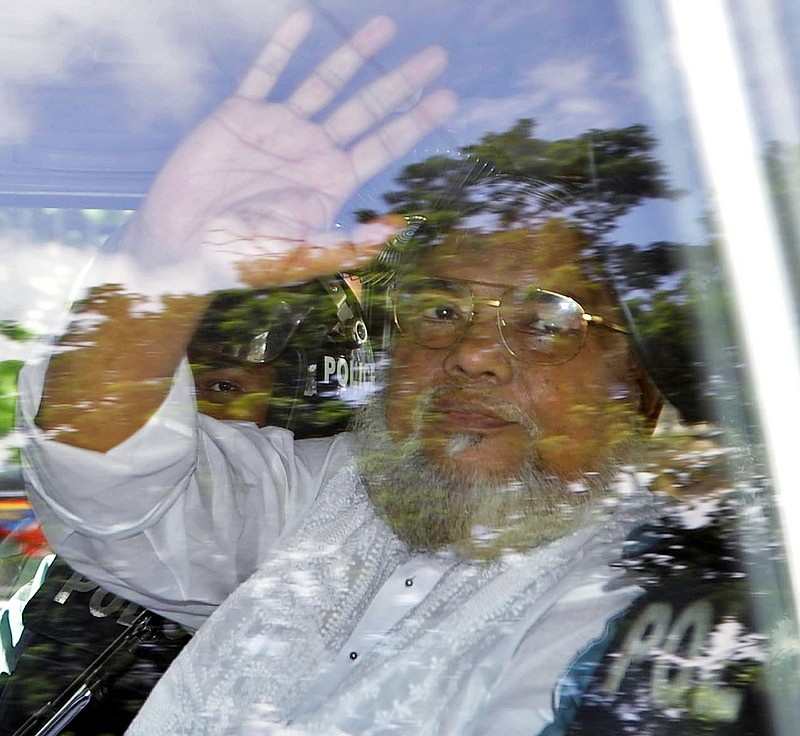NEW DELHI (AP) - Bangladesh executed two influential opposition leaders who had been convicted of committing war crimes during the country's 1971 independence war against Pakistan, a senior jail official said Sunday, despite concerns raised by the United States and human rights groups that the legal proceedings that led to the death sentences were flawed.
Bangladesh Nationalist Party leader Salahuddin Quader Chowdhury and Jamaat-e-Islami Secretary General Ali Ahsan Mohammad Mujahid were executed at 12:55 a.m. at Dhaka Central Jail in the nation's capital, Senior Jail Superintendent Mohammad Jahangir Kabir told The Associated Press.
"They have been hanged together, at the same time," Kabir said.
Security was strengthened near the jail and elsewhere to avoid any violence. A few hours after the execution, a security detail escorted ambulances carrying the men's bodies to their ancestral homes where their families were to perform the religious burial rituals.
"We have ensured security en route to their homes where they will be buried," said Munirul Islam, a senior police detective said outside the jail as the ambulances carrying the bodies left the area.
The nation was on high alert in anticipation of the executions. Paramilitary border guards were deployed mainly in the capital, Dhaka, and southeastern district of Chittagong to assist police, a common practice when there is any anticipation of violence.
Following the executions, the Islamist Jamaat-e-Islami party issued a statement calling for a nationwide general strike on Monday.
Mujahid and Chowdhury were convicted and sentenced to death by a special tribunal in 2013 for war crimes committed during the 1971 war. Chowdhury was convicted on of charges of torture, rape and genocide, while Mujahid was found guilty on charges of genocide, conspiracy in killing intellectuals, torture and abduction.
On Wednesday, Bangladesh's Supreme Court upheld the death sentences against the two men. On Saturday, President Mohammad Abdul Hamid rejected a clemency appeal clearing the way for the executions to proceed, Home Minister Asaduzzaman Khan Kamal said.
The families of Chowdhury and Mujahid met them for the last time inside Dhaka Central Jail on Saturday evening, authorities said.
Jamaat-e-Islami and the Bangladesh Nationalist Party say the trials were politically motivated. Prime Minister Sheikh Hasina, leader of the Awami League party, has denied the allegations. Hasina earlier acknowledged that she faced international pressure for trying opposition figures for war crimes, but vowed to continue the trials "to ensure justice for the families of the slain people" from the 1971 war.
Bangladesh was the eastern part of Pakistan until the 1971 war of independence. The Bangladesh government says that Pakistani soldiers, aided by local collaborators, killed 3 million people and raped 200,000 women during the war.
The Islamist party had campaigned openly against independence and its then chief Ghulam Azam toured the Middle East to campaign against the struggle for independence.
Mujahid , 67, was the head of Islami Chhatra Sangha, then the student wing of the Jamaat-e-Islami party in the eastern part of Pakistan in 1971. He was accused of being the mastermind behind the killing of intellectuals, including teachers and journalists, days before the Pakistani military surrendered to a joint force of freedom fighters and Indian army units on Dec. 16, 1971, after a bloody nine-month war.
Chowdhury, 66, whose father was a Speaker of Pakistan's National Assembly and at times, the Acting President of Pakistan, also actively opposed Bangladeshi independence. He was accused of carrying out war crimes, including killing more than 200 civilians, mostly minority Hindus, during the independence war, according to evidence presented at the tribunal.
Hasina's move to try the war crimes suspects has a popular mandate since she pledged to hold such trials during the 2008 election campaign which brought her party to power with an overwhelming majority.
More than 15 people, mostly leaders of Jamaat-e-Islami, have been convicted of war crimes in as series of rulings handed down by two separate tribunals set up by Hasina in 2010. Two senior leaders of Jamaat-e-Islami have already been executed.
U.S. lawmakers overseeing foreign policy described the war crimes tribunal as "very flawed" and a means of political retribution. The State Department was less pointed, saying Friday that executions should not take place until it's clear the trial process meets international standards.
Stephen Rapp, who until August served as President Barack Obama's ambassador for war crimes, said it was "disturbing" that Chowdhury was denied the right to call alibi witnesses, including a former U.S. ambassador, to provide testimony that he was not present in Bangladesh at the time the alleged crimes were committed.
Human Rights Watch said the tribunal allowed the prosecution to call 41 witnesses, while Chowdhury's defense was limited to four witnesses. The New York-based group said Mujahid was sentenced to death for instigating his subordinates to commit abuses, although no subordinates testified or were identified.
Leaders of the House Foreign Affairs Committee, in a letter sent Tuesday to the top U.S. diplomat for South Asia, voiced concern that "democratic space is shrinking" in Bangladesh amid "a growing climate of violence, fear and self-censorship."
Since February four secular bloggers, a publisher, and two foreigners - an Italian aid worker and a Japanese agriculture researcher - have been killed in attacks linked to Islamic militants.
The Islamic State claimed responsibility for some of the attacks, but authorities say the Sunni extremist group has no presence in the country. Instead, Hasina has blamed the attacks on the Bangladesh Nationalist Party and its main ally, Jamaat-e-Islami, accusing the opposition parties of trying to destabilize the country and halt the war crimes trials. Both opposition parties denied the allegation.
Such extremist violence was once rare in Bangladesh, which is mostly Muslim but has a strong secular tradition.
____
Associated Press writer Matthew Pennington in Washington contributed to this report.
